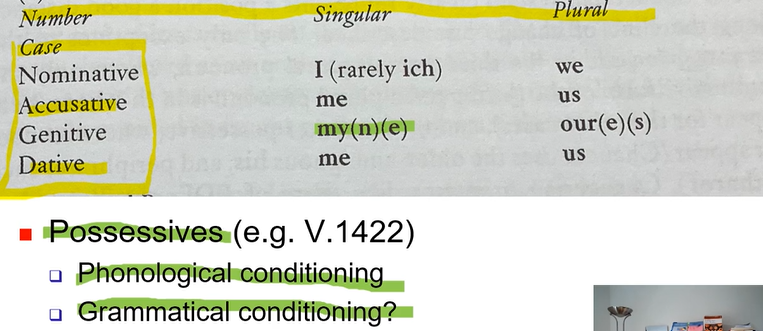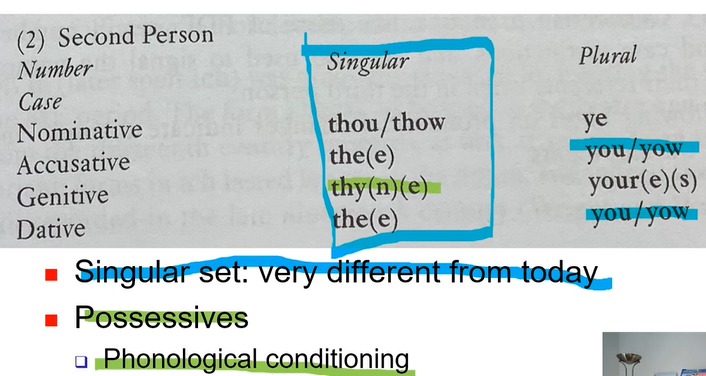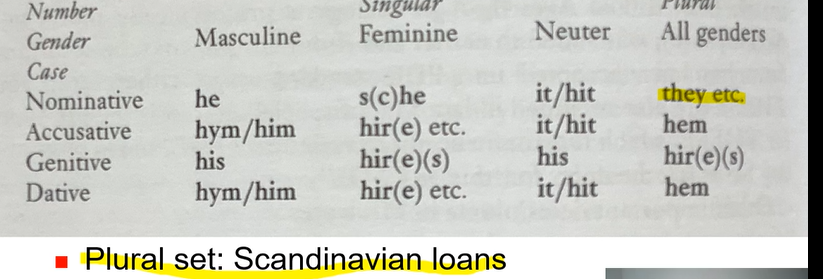languages, pronouns & sociohistorical context
1/8
There's no tags or description
Looks like no tags are added yet.
Name | Mastery | Learn | Test | Matching | Spaced | Call with Kai |
|---|
No analytics yet
Send a link to your students to track their progress
9 Terms
situation in the Old English period
Germanic
Celtic
Romance
Latin: Lingua Franca of the time
Grammatical Categories and Forms
Categories
Person
Number
Case
Gender
Forms
very suppletive paradigm
suppletive paradigm
forms are not formally related
person
Posessives:
phonological conditioning: environment determines form
grammatical conditioning: tells about word class/ grammatical environment

2.person

person

Early Middle English
1066-1204
◼ 1066: Norman Conquest under William the Conqueror –
William the Bastard?
◼ Context: Edward the Confessor
dies without an heir
◼ Struggle for succession!
Harold Godwinson becomes king
Rivals:
• Harald of Norway
• William of Normandy
◼ 14th October: Battle of Battle!
◼ Norman administration/clergy: few people!
◼ New social system: feudalism
◼ 1086: Domesday Book – tax assessment
◼ Barely any French loan words
◼ 1170: Henry II expands dominion → Ireland!
◼ Wales is still independent
◼ Scotland anglicized in the south
High Middle English
1204-1400
◼ Henry II (1154-1189): Angevin Empire
◼ Several children
❑ Richard “Lionheart“ (1189-1199)
❑ John “Softsword“/“Lackland“ (1199-1216)
◼ King John “Softsword“/“Lackland“ 1199: King of England,
conflict with nobility
◼ Peace with Philipp II of France
→cessions of territory
◼ 1200: marriage with Isabella
(Philipp‘s Cousin) as a means of
maintaining power
◼ 1202-1204: several defeats
Nobility settled in England permanently
◼ Language contact
◼ Bilingualism
◼ Diglossia (court vs. back home)
◼ Massive French influence on vocabulary
◼ from 1370s on: emancipation of English literature
◼ Wales became anglicized by the “Edwards“ (1-3)
Late Middle English
1400-1476
◼ French influence decreases
❑ Fewer loan words
❑ 1362: opening of the parliament in English
❑ Status of French – language of the enemy!
◼ 1337-1454: Hundred Years‘ War
❑ Succession to the French throne unclear
◼ War of Roses (1455-1487)
❑ Competing but related dynastic families:
❑ Lancaster (red rose)
❑ York (white rose)
◼ 1476: printing press – Caxton
◼ 1485: Battle of Bosworth
❑ Richard III vs. Henry Tudor
❑ Henry VII marries Elizabeth of York
◼ Tudors as the new dynasty